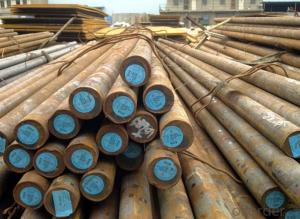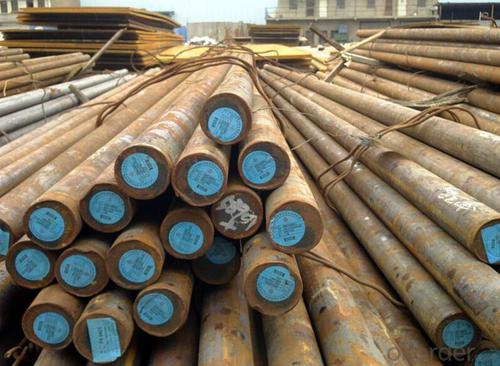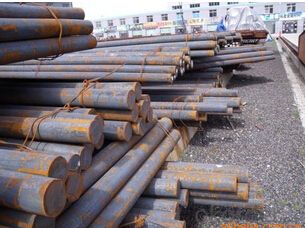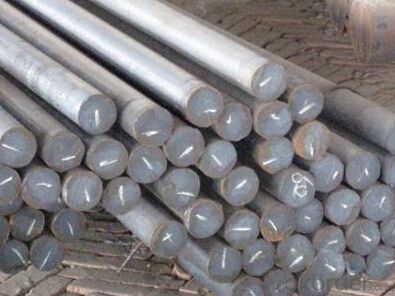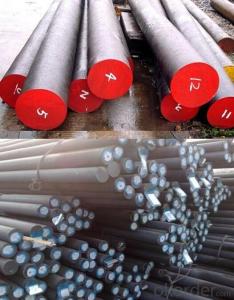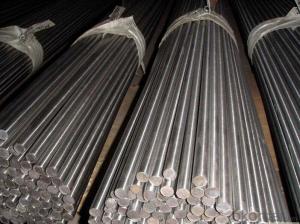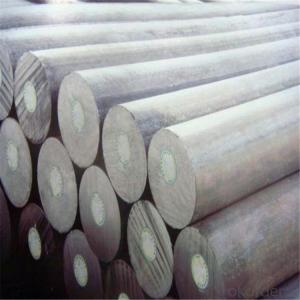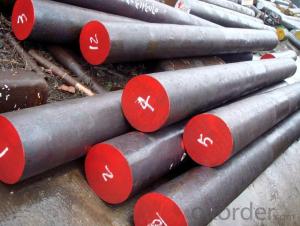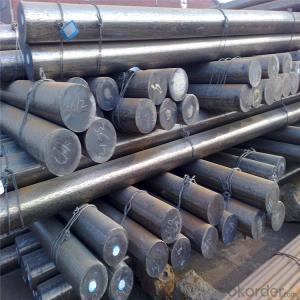Forged Bearing Alloy Steel Round Bar DIN 1.3505 EN 100Cr6
- Loading Port:
- Qingdao
- Payment Terms:
- TT OR LC
- Min Order Qty:
- 5 m.t.
- Supply Capability:
- 100000 m.t./month
OKorder Service Pledge
Quality Product, Order Online Tracking, Timely Delivery
OKorder Financial Service
Credit Rating, Credit Services, Credit Purchasing
You Might Also Like
Specification
Type:
Carbon Steel,Alloy Steel,Spring Steel,Bearing Steel,Gear Steel,Deformed Steel,Stainless Steel
Shape:
Steel Coil,Steel Sheet,Steel Wire Rod,Steel Flat Bar,Steel Square Bar,Steel Angle,Steel Round Bar,Steel Billets
Technique:
Spring,EFW,Extruded,Saw,Forged,ERW,Cold Drawn,Hot Rolled,Cold Rolled
Surface Treatment:
Bright,Polished,Chromed Passivation,Dry,Oiled,Color Coated,Copper Coated,Coated,Galvanized,Black,PVDF Coated
Certification:
UL,BSI,API,CE,RoHS,IBR,BV,SGS,ISO
Thickness:
6-960mm
Width:
6-960mm
Length:
6-12m
Outer Diameter:
6-960mm
Net Weight:
100kg
Packaging:
seaworthy packaging
Forged Bearing Alloy Steel Round Bar DIN 1.3505 EN 100Cr6
Detailed Information of Forged Bearing Alloy Steel Round Bar DIN 1.3505 EN 100Cr6
| Name | Steel Round Bar |
| Shape | Round Bar/Square Bar/Flat Bar/Plate/Wire |
| Standard | GB/ASTM/SAE/AISI/DIN/JIS/EN/BS |
| Surface Treatment: | Black/Peeling/Polished/Machined |
| Delivery Condition: | Hot Rolled or Forged/Peeled or Black Surface |
| Test | SGS/UT 100% Elements Testing |
| Certificate: | ISO/Mill Certificate |
| Service: | 24 hours online service / |
| more than 20 years trading and manufacture | |
| Quality Assurance: | the third party inspection, such as SGS, BV, TUV…etc. is acceptable |
| Packaging Details: | Seaworthy Packaging or as per customer's packing instruction |
Product Overviews of Special Steel 8620H 40CrNiMoA Iron Round Steel Bar
| Product Name | Typical Grades | Diameter(mm) | Standard Adopted |
| Carbon Steel | 20 (1020/S20C/C22) | ||
| 40 (1040/S40C/C40) | Ø16-Ø300 | ||
| 45 (1045/S45C/C45) | |||
| Bearing Steel | GCr9 (51100/SUJ1) | ||
| GCr15 (52100/SUJ2/100Gr6) | Ø12-Ø250 | ||
| GCr9SiMn (A485-Gr.1/SUJ3) | GB/SAE/ | ||
| Cr-Mo Steel | 20Cr (5120/SCr420H/20Cr4) | JIS/DIN | |
| 40Cr (5140/SCr440/41Cr4) | Ø12-Ø250 | ||
| 42CrMo(4140/SCM440/42CrMo4) | |||
| Gear Steel | 20CrNiMo | ||
| 20CrMn(5115/SMnC420/20MnCr5) | Ø16-Ø600 | ||
| 20CrNiMo(8620/SNCM220/20CrMiMo2) |
Company Introduction of Forged Bearing Alloy Steel Round Bar DIN 1.3505 EN 100Cr6
CNBM International Corporation is the most import and export platform of CNBM group(China National Building Material Group Corporation) ,which is a state-owned enterprise, ranked in 270th of Fortune Global 500 in 2015.
With its advantages, CNBM International are mainly concentrate on Cement, Glass, Iron and Steel, Ceramics industries and devotes herself for supplying high quality series of refractories as well as technical consultancies and logistics solution.
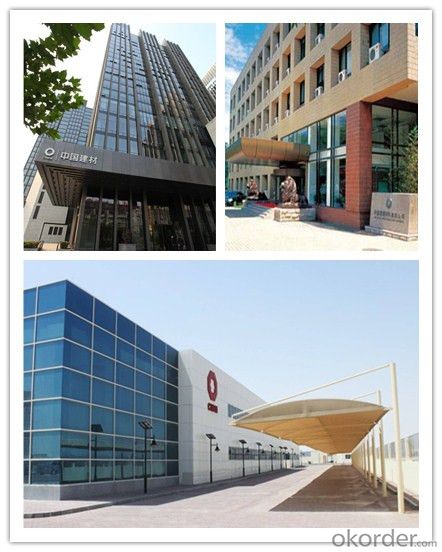
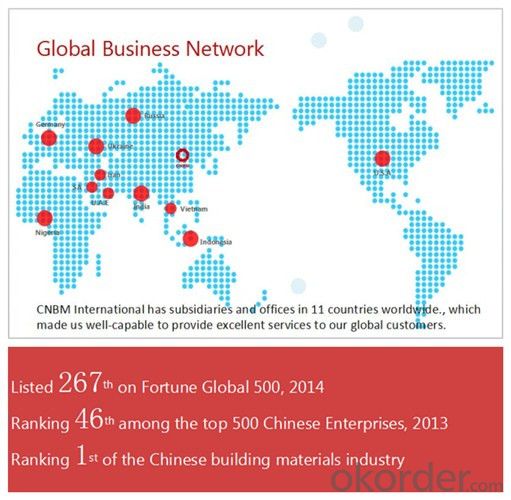
| After-sale service | l CNBM provides the services and support you need for every step of our cooperation. We’re the business partners you can trust; you can relax and get on with doing business. |
| l For any problem, please kindly contact us at any your convenient time, we’ll reply you in our first priority within 24 hours | |
| Advantages | l Industry experience over 20 years. |
| l Shipment of goods -More than 70 countries worldwide. | |
| l The most convenient transport and prompt delivery. | |
| l Competitive price with best service. | |
| l High technical production line with top quality products. | |
| l High reputation based on best quality products. | |
Packaging & Delivery of Forged Bearing Alloy Steel Round Bar DIN 1.3505 EN 100Cr6
| Packaging Detail | Sea worthy packing /as per customer's packing instruction |
| Delivery Detail | 15 ~ 40 days after receiving the deposit |
Products Show
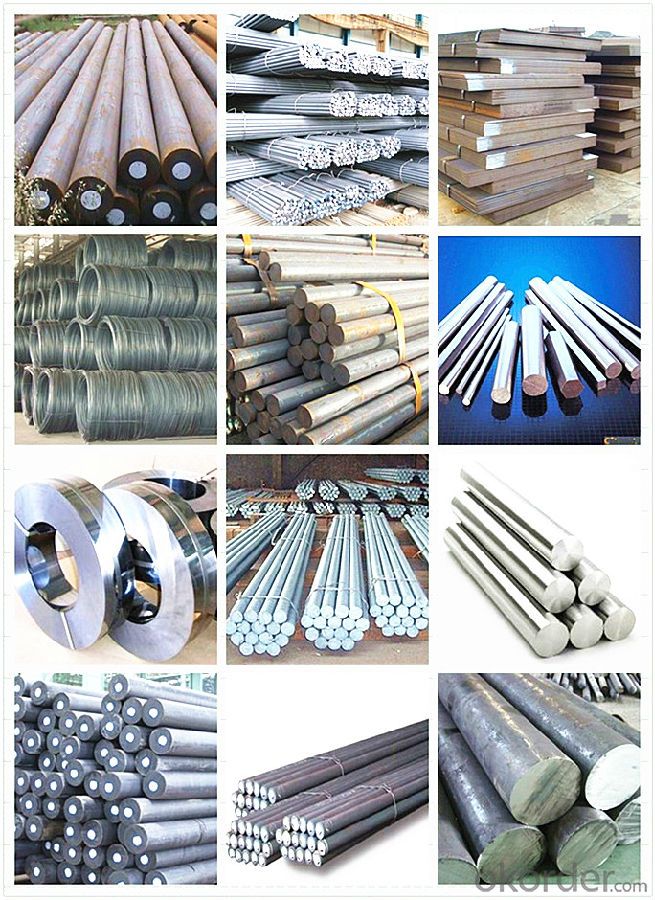
FAQ:
| Are you a trading company or manufacturer? | Manufacturer |
| What’s the MOQ? | 1000m2 |
| What’s your delivery time? | 15-20 days after downpayment received |
| Do you Accept OEM service? | Yes |
| what’s your delivery terms? | FOB/CFR/CIF |
| What's the Payment Terms? | 30% as deposit,70% before shipment by T/T |
| Western Union acceptable for small amount. | |
| L/C acceptable for large amount. | |
| Scrow ,Paybal,Alipay are also ok | |
| Why choose us? | Chose happens because of quality, then price, We can give you both. Additionally, we can also offer professional products inquiry, products knowledge train (for agents), smooth goods delivery, excellent customer solution proposals. |
| What's your available port of Shipment? | Main Port, China |
| What’s your featured services? | Our service formula: good quality+ good price+ good service=customer's trust |
| Where are your Market? | Covering more than 160 countries in the world |
- Q: What are the common quality control measures for special steel?
- Special steel undergoes various quality control measures to ensure its compliance with desired properties and specifications. These measures are as follows: 1. To ensure the required chemical compositions, chemical composition analysis techniques, such as spectrometry, are employed. 2. Mechanical testing, including tensile testing, hardness testing, impact testing, and fatigue testing, is conducted to verify the steel's mechanical properties, such as strength, hardness, toughness, and ductility. 3. Non-destructive testing methods, like ultrasonic testing, magnetic particle testing, and dye penetrant testing, are utilized to detect any internal or surface defects in the steel, ensuring its integrity and reliability. 4. Precise dimensional inspection is carried out to measure critical dimensions, such as length, width, thickness, and diameter, in accordance with customer requirements or industry standards. 5. Surface quality inspection ensures that the steel meets the required surface quality standards by examining it for defects such as cracks, pits, scratches, or unevenness. 6. The effectiveness of the heat treatment process, which includes annealing, quenching, or tempering, is verified through hardness testing or microstructure analysis. 7. Comprehensive documentation and traceability records are maintained to ensure quality consistency and provide a reference for future use or troubleshooting. These records include details of the production process, chemical composition, mechanical properties, and any inspections or tests performed. By implementing these quality control measures, manufacturers can guarantee that special steel meets the required specifications, offering customers high-quality and dependable products for their specific applications.
- Q: What are the challenges in casting special steel?
- One of the challenges in casting special steel is the high melting point of the material. Special steels often have a higher carbon content or alloying elements, which increases their melting point. This requires the use of specialized furnaces and techniques to reach and maintain the necessary temperature for casting. Additionally, special steels can be prone to defects such as porosity, inclusions, and segregation during the casting process. These defects can negatively impact the mechanical properties and overall quality of the steel, making it difficult to achieve the desired specifications. Therefore, strict control over the casting conditions, including temperature, mold design, and pouring techniques, is crucial to overcome these challenges and produce high-quality special steel castings.
- Q: What are the different testing methods used for special steel?
- Some of the common testing methods used for special steel include hardness testing, tensile testing, impact testing, metallographic examination, chemical analysis, and non-destructive testing. These methods help assess the mechanical properties, microstructure, chemical composition, and overall integrity of special steel, ensuring its suitability for various applications.
- Q: What are the different applications of high-speed special steel?
- High-speed special steel has a wide range of applications in various industries. It is primarily used in the manufacturing of cutting tools, such as drills, milling cutters, and saw blades, due to its excellent hardness, toughness, and heat resistance properties. Additionally, it finds application in the production of high-speed bearings, gears, and springs in automotive and aerospace industries. High-speed special steel is also utilized in the construction of turbine blades, dies, and molds for the manufacturing sector. Overall, its exceptional performance characteristics make it an indispensable material for achieving precision and efficiency in numerous industrial applications.
- Q: How are cobalt-based alloys used in dental applications?
- Cobalt-based alloys are commonly used in dental applications due to their excellent mechanical properties, corrosion resistance, and biocompatibility. They are used in dental prosthetics, such as crowns, bridges, and dentures, as well as in dental implants. These alloys provide high strength and durability, ensuring long-lasting dental restorations. Additionally, their biocompatibility ensures that they do not cause any adverse reactions in the oral environment.
- Q: How does special steel contribute to the manufacturing of aerospace components?
- The unique properties and characteristics of special steel make it an essential material in the manufacturing of aerospace components. Its exceptional strength, durability, and ability to withstand extreme temperatures and corrosion make it ideal for various applications in the aerospace industry. A major benefit of special steel in aerospace manufacturing is its capacity to endure high stress and pressure. During flight, aerospace components such as turbine blades, landing gear, and structural supports face tremendous forces. Special steel's strength and toughness enable these components to withstand these forces without failure, ensuring the safety and reliability of the aircraft. Moreover, special steel's resistance to extreme temperatures is crucial in the aerospace industry. For instance, aircraft engines operate at extremely high temperatures. Special steel alloys, like those containing nickel or cobalt, are used to manufacture components such as turbine discs and combustion chambers. These alloys can withstand the intense heat, preventing deformation or failure and ensuring optimal engine performance and efficiency. Additionally, special steel's resistance to corrosion is vital for aerospace applications. Aircraft are constantly exposed to harsh environmental conditions, including moisture, chemicals, and saltwater. Special steel alloys, such as stainless steel, exhibit high resistance to corrosion, preventing degradation and maintaining the structural integrity of aerospace components over time. This is particularly critical for crucial parts like fuel tanks, hydraulic systems, and airframe structures. In conclusion, special steel plays a significant role in the manufacturing of aerospace components by providing strength, durability, resistance to extreme temperatures, and corrosion resistance. Its unique properties guarantee the safety, reliability, and longevity of aerospace systems, making it an indispensable material in the aerospace industry.
- Q: What are the specific requirements for special steel used in the nuclear waste storage industry?
- The specific requirements for special steel used in the nuclear waste storage industry are stringent and critical for ensuring the safety and long-term viability of the storage facilities. These requirements are primarily driven by the need to mitigate the potential risks associated with nuclear waste, such as radiation leakage and corrosion. One of the key requirements is high strength and durability. Special steel used in nuclear waste storage must have exceptional mechanical properties to withstand the weight and pressure exerted by the waste containers and the surrounding environment. This includes resistance to deformation, fracture, and fatigue, as well as the ability to maintain its structural integrity over an extended period. Another crucial requirement is excellent corrosion resistance. Nuclear waste contains highly corrosive substances that can degrade regular steel over time. Therefore, special steel used in the nuclear waste storage industry must have enhanced corrosion resistance to ensure long-term durability and prevent leakage of radioactive materials. Moreover, the steel must have a low susceptibility to stress corrosion cracking (SCC). SCC occurs when a combination of tensile stress, corrosive environment, and specific material conditions result in crack initiation and propagation. Given the potential consequences of a breach in the storage facility, the steel used must be highly resistant to SCC to ensure the integrity of the containers and minimize the risk of leakage. Radiation resistance is also a critical requirement for special steel used in nuclear waste storage. The steel should exhibit minimal degradation or embrittlement when exposed to high levels of radiation. This is essential to maintain the structural integrity of the storage containers and prevent any weakening that could compromise the containment of the waste. Additionally, the special steel used in the nuclear waste storage industry must comply with strict regulatory standards and certifications. It must meet specific design codes and guidelines set by regulatory authorities to ensure compliance with safety regulations and minimize potential hazards. In summary, the specific requirements for special steel used in the nuclear waste storage industry include high strength, durability, corrosion resistance, low susceptibility to stress corrosion cracking, radiation resistance, and compliance with regulatory standards. These requirements are crucial for maintaining the safety and integrity of the storage facilities and preventing any leakage or release of radioactive materials into the environment.
- Q: How is special steel used in toolmaking?
- Due to its exceptional properties, special steel is widely utilized in toolmaking to create durable and high-performance tools. Various tools, including drills, saws, cutting tools, dies, and molds, are manufactured in toolmaking. The purpose of incorporating special steel in toolmaking is to guarantee that these tools possess the necessary strength, hardness, toughness, and wear resistance needed for their intended applications. The primary advantage of special steel in toolmaking is its high strength. This is achieved by alloying special steel with elements such as chromium, molybdenum, vanadium, and tungsten, which enhance its strength and hardness. Consequently, the tools can endure heavy loads, resist deformation, and maintain their structural integrity even under extreme working conditions. In addition to strength, special steel also exhibits excellent hardness. Heat treatment processes like quenching and tempering are applied to tools made from special steel to achieve the desired hardness level. This hardness is crucial in toolmaking as it allows the tools to efficiently cut, drill, or shape various materials without succumbing to damage or wear easily. Furthermore, special steel possesses exceptional toughness. Toughness refers to a material's ability to absorb energy and resist cracking or fracturing. Tools made from special steel can withstand impact and heavy loads, ensuring that they remain intact and do not chip easily during use. This is of utmost importance in toolmaking as tools often encounter high-stress situations where toughness is essential to prevent premature failure. Another significant advantage of special steel in toolmaking is its excellent wear resistance. Constant friction, abrasion, and contact with hard materials subject tools to wear and tear. Special steel is designed specifically to resist wear, allowing the tools to maintain their cutting or shaping abilities over prolonged periods. Consequently, the tool's lifespan is extended, ensuring consistent performance and high-quality output. Special steel is also renowned for its corrosion resistance, which is advantageous in toolmaking, especially when working with corrosive materials or in harsh environments. The inclusion of certain elements like chromium in special steel enhances its resistance to corrosion, preventing rust and deterioration of the tools. In conclusion, special steel is an indispensable material in toolmaking as it provides the necessary strength, hardness, toughness, wear resistance, and corrosion resistance. These properties enable tools to perform effectively and efficiently, ensuring durability and longevity. Whether it is for cutting, drilling, shaping, or molding, special steel is essential in producing high-quality tools that meet the demands of various industries.
- Q: What are the different surface protection methods for special steel?
- There are several surface protection methods available for special steel, each with its own advantages and applications. Here are some of the most common methods: 1. Coating: Coating is a widely used method to protect the surface of special steel. This can involve applying a layer of paint, powder coating, or electroplating. Coatings provide a barrier between the steel and the environment, preventing corrosion and enhancing the aesthetics of the steel surface. 2. Galvanization: Galvanization involves coating the special steel with a layer of zinc through a process called hot-dip galvanizing. This method provides excellent corrosion resistance and is commonly used for outdoor structures and equipment exposed to harsh environments. 3. Passivation: Passivation is a chemical process that removes surface contaminants and forms a protective oxide layer on the special steel's surface. This method improves the steel's resistance to corrosion and is often used for stainless steel. 4. Nitriding: Nitriding is a heat-treatment process that diffuses nitrogen into the surface of the special steel, forming a hard and wear-resistant layer. This method enhances the steel's durability, resistance to fatigue, and corrosion resistance, making it suitable for applications involving heavy loads or abrasive environments. 5. PVD and CVD coatings: Physical Vapor Deposition (PVD) and Chemical Vapor Deposition (CVD) are methods used to deposit thin films of various materials onto the special steel surface. These coatings can provide enhanced hardness, wear resistance, and low friction properties, making them ideal for cutting tools, molds, and high-performance applications. 6. Shot peening: Shot peening is a mechanical surface treatment method that involves bombarding the special steel surface with small spherical particles. This process induces compressive stresses in the steel, improving its fatigue life, resistance to stress corrosion cracking, and wear resistance. 7. Anodizing: Anodizing is a process used primarily for aluminum, but it can also be applied to some special steel alloys. By creating an oxide layer on the surface, anodizing improves corrosion resistance and allows for the application of decorative finishes. Each of these surface protection methods offers unique properties and benefits, and the choice of method depends on the specific requirements of the special steel application.
- Q: What is special steel? What is special steel?
- However, special steel refers to stainless steel, other special steel plate, such as automobile steel plate and military steel plate, etc., stainless steel is divided into austenite and ferrite, such as 304316410439 stainless steel varieties. According to the specific use of stainless steel quality, such as 409L can be used as a container, microwave oven and elevator industry, 304 can be used as medical devices. The market prospect is not an ordinary person can predict, domestic steel prices are monthly pricing, big companies such as Baosteel, TISCO, Zhangjiagang Pohang. Lead the trend of special steel prices.
Send your message to us
Forged Bearing Alloy Steel Round Bar DIN 1.3505 EN 100Cr6
- Loading Port:
- Qingdao
- Payment Terms:
- TT OR LC
- Min Order Qty:
- 5 m.t.
- Supply Capability:
- 100000 m.t./month
OKorder Service Pledge
Quality Product, Order Online Tracking, Timely Delivery
OKorder Financial Service
Credit Rating, Credit Services, Credit Purchasing
Similar products
Hot products
Hot Searches
Related keywords
